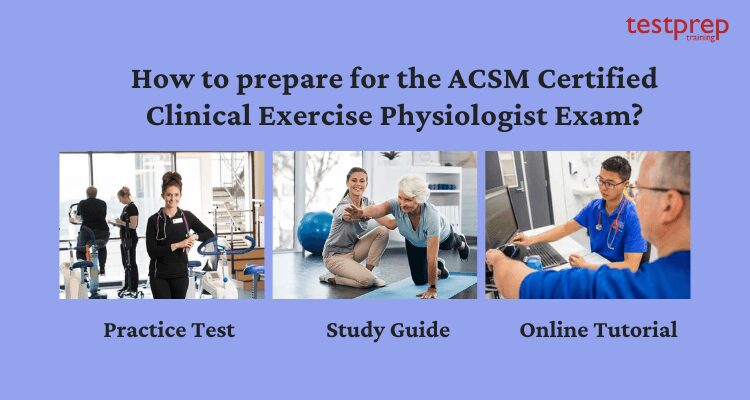The ACSM Certified Clinical Exercise Physiologist (CEP) Exam is a certification exam by the American College of Sports Medicine (ACSM). The exam is designed to test the knowledge and skills of exercise physiologists who work with patients with chronic conditions or disabilities. The CEP certification is intended for those who hold a bachelor’s or higher degree in exercise science or a related field and have completed at least 600 hours of clinical experience working with patients in a healthcare setting. The exam covers topics such as exercise testing and prescription, clinical assessments, patient education, and medical considerations for exercise.
ACSM Certified Clinical Exercise Physiologist Course Outline
This initial step is very important to get a complete idea about the exam –
- Patient Assessment
- Exercise Testing
- Understanding Exercise Prescription
- Exercise Training and Leadership
- Education and Behavior Change
- Legal and Professional Responsibilities

ACSM Certified Clinical Exercise Physiologist Exam Glossary
- Aerobic Capacity: The ability of the body to use oxygen during exercise to produce energy.
- Anaerobic Threshold: The point during exercise at which the body switches from primarily aerobic metabolism to primarily anaerobic metabolism.
- Anthropometry: The measurement of body size and proportions, including height, weight, body composition, and girth measurements.
- Cardiac Output: The amount of blood the heart pumps per minute.
- Dyspnea: Shortness of breath or difficulty breathing.
- Echocardiography: A test that uses ultrasound to create images of the heart’s structure and function.
- Electrocardiogram (ECG or EKG): A test that measures the electrical activity of the heart.
- Learn Exercise Prescription: A plan that outlines the specific type, intensity, frequency, and duration of exercise recommended for an individual.
- Fatigue: A state of physical or mental exhaustion.
- GXT (Graded Exercise Test): A test that gradually increases the intensity of exercise to measure cardiorespiratory fitness and to identify abnormalities in heart function.
- Isometric Exercise: Exercise in which muscles contract without significant movement of the body.
- Metabolic Equivalent (MET): A unit of measurement used to estimate the energy expenditure of physical activities.
- Myocardial Infarction (MI): A heart attack, which occurs when blood flow to a part of the heart is block.
- Peripheral Vascular Disease (PVD): A condition in which the arteries that supply blood to the legs or arms become narrowed or blocked.
- Pulmonary Function Test (PFT): A test that measures lung function, including how much air can be inhale and exhale and how quickly air can be move in and out of the lungs.
How to prepare for the ACSM Certified Clinical Exercise Physiologist Exam?
Here are some official resources for the ACSM Certified Clinical Exercise Physiologist exam:
- ACSM Certification Handbook: This handbook provides detailed information about the exam, including eligibility requirements, registration procedures, exam content outline, and study resources. You can download the handbook from the ACSM website: https://www.acsm.org/get-stay-certified/get-certified/ccep.
- ACSM Exam Content Outline: This outline provides a breakdown of the topics covered on the exam, including exercise physiology, clinical assessment, exercise prescription, and program administration. You can access the content outline on the ACSM website: https://www.acsm.org/get-stay-certified/get-certified/ccep.
- ACSM Certification Exam Study Resources: The ACSM offers a variety of study resources, including practice exams, flashcards, and study guides. You can purchase these resources on the ACSM website: https://www.acsm.org/get-stay-certified/get-certified/ccep.
- ACSM Exam Candidate Handbook: This handbook provides information about the exam format, test center policies, and what to expect on exam day. You can download the handbook from the Pearson VUE website: https://home.pearsonvue.com/acsm.
- ACSM Continuing Education Opportunities: The ACSM offers a variety of continuing education opportunities, including workshops, webinars, and online courses. You can browse the ACSM’s continuing education offerings on their website: https://www.acsm.org/get-stay-certified/continuing-education.
ACSM Certified Clinical Exercise Physiologist Exam Tips and Tricks
Here are some tips and tricks to help you prepare for the ACSM Certified Clinical Exercise Physiologist exam:
- Start studying early: Give yourself plenty of time to prepare for the exam. The ACSM recommends studying for at least 3-6 months before the exam.
- Know the exam content outline: Familiarize yourself with the exam content outline and make sure you understand all of the topics covered on the exam.
- Use multiple study resources: The ACSM offers a variety of study resources, including practice exams, flashcards, and study guides. Use multiple resources to reinforce your knowledge and prepare for different types of exam questions.
- Focus on clinical applications: The exam is design to test your ability to apply exercise physiology concepts to real-life clinical situations. Make sure you understand how to assess and prescribe exercise for individuals with different health conditions.
- Practice time management: You will have a limit amount of time to answer each question. Practice time management strategies, such as skipping difficult questions and coming back to them later.
- Take advantage of practice exams: Take practice exams to get a feel for the types of questions you will encounter on the exam. Analyze your results and focus your studying on areas where you need improvement.
- Get enough rest before the exam: Make sure you get enough sleep and rest before the exam.
Bonus Tip!
“How long should I study?” is another question you may have. This answer is simple – everyone is unique. Depending on their relevant experience, most take between 3 and 9 months to prepare. At the end of the day, committing to an exam date is one of the most important steps you can take.
Write down when you intend to take the Certified Clinical Exercise Physiologist exam and the steps you will need to take to get there. For example, how many chapters do you need to read per week when you intend to review practice questions, and how and when you intend to do final prep before your exam. When you have competing priorities, choosing an exam day and writing out your study plan can help you stay focused. Hurry up and start preparing right now!


